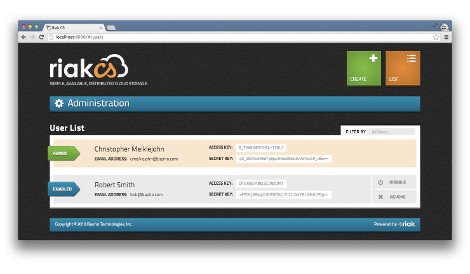Amazon has become a big competitor to providers outsourced data center services, and they know it. Their colocation, dedicated servers, managed services offerings and existing customer base, however, can be advantages in going after the demand for hybrid deployments many enterprise customers are looking at.
Helping traditional providers stand up cloud infrastructure in their data centers is a high-demand market now, and vendors large and small are lining up. Both proprietary and open-source solutions have emerged, and a few companies have formed around the latter. One such company is Cambridge, Massachussetts-based Basho Technologies.The company offers software that turns commodity hardware into cloud-storage clusters. At the core is its open-source distributed database Riak.
Open source to more open source
In March, Basho open-sourced the cloud-storage software it built on top of Riak, called Riak CS, as well. The idea is that with open access, more people will learn about Riak CS and buy the proprietary Riak CS Enterprise, which is Riak CS with additional enterprise-specific features.
As Shanley Kane, Basho’s director of product management, explains, in addition to turning it into a storage system, Riak CS provides Riak with features like multi-tenancy, an API (application programming interface) that makes it compatible with Amazon's S3 cloud storage services and per-user reporting.
The money-maker
Riak CS Enterprise is Basho’s main attempt to monetize Riak CS. It adds multi-data-center replication and around-the-clock support.
Besides Amazon itself, Basho is competing with traditional storage vendors, big software vendors and other open-source cloud systems, namely OpenStack and CloudStack. OpenStack, has a cloud-storage component called Swift. However, companies sometimes use the compute portion of OpenStack or CloudStack, while using Riak CS for the storage piece.
The software-only edge
Founded in 2007, Basho is a fairly young firm, and Riak CS has been on the market for about one year. Simon Robinson, analyst with the 451 Group, says the move to open-source Riak CS was a right one and well expected.
“It was a question of when instead of if,” as he puts it. Robinson does expect the move to open-source the core cloud-storage technology to attract more clients. Basho customers that have tried it have given Robinson positive reviews, he says. Making it open-source means more people will test it out and see for themselves.
And people are on the lookout for something like Riak CS Enterprise. The majority of service providers are really interested is such solutions, Robinson says. “They know that they’re competing with Amazon. They know that they have to get similar functionality.”
Unlike most incumbent storage-hardware vendors, for whom cloud-storage software is really just another way to sell hardware, Basho is only selling the software. This intelligence layer is what many service providers are looking for, since they may already have the spare storage capacity they can use for cloud, Robinson explains.
Sustained innovation is a must
But, Basho is not the only game in town, he adds. In addion to Swift, there are companies like InkTank and Scality, both of which are going after the same market.
One danger for Basho, is that Swift may become more functional over time, so Basho will have to continue to innovate if it wants to retain its technological lead over the open-source competitor, Robinson says.
Another example is EMC, one of the big storage vendors, which will sell you a virtual-appliance version of its cloud storage product Atmos. The software works with VMware’s virtualization platform, however, so the customer needs to buy a VMware hypervisor license if they want to use it.
Despite competition and its young age, Basho has already won some big-name end users and gained a reputation as a player to contend with in the cloud-storage space. Its customers include Yahoo! Japan, IDC Frontier, Rovio and Datapite. The last company, by the way, is using Riak CS in combination with CloudStack, Kane says.
But the cloud-storage space is hot and many companies are after this business. So the road ahead will not be an easy one for the open-source software start-up.
Correction: This article has been corrected from its previous version. Corrections made include the year of Basho's founding and enterprise features of Riak CS Enterprise.

